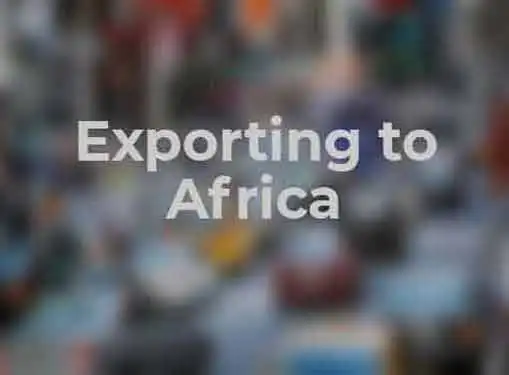Articles on Exporting
Exporting to Africa
From Algeria to Zimbabwe, the African content is ripe with opportunity for U.S. exporters. Here are a few key things you need to know to sell your products in Africa.
Today's global marketplace has opened the door for entrepreneurs to sell their merchandise to consumers around the world -- including Africa.

Although exporting to Africa is more complicated than domestic selling, it can be done. Here's what you need to know . . .
In a lot of ways, Africa is a continent of contradictions. Despite the extreme poverty that exists throughout the region, many of its economies are on the rise, creating new opportunities for American business owners. Yet at the same time, Africa's infrastructure is struggling to keep up with the pace of international commerce. A single botched deal can have expensive ramifications, so new exporters need to make themselves aware of the challenges sooner rather later.
Shipping and communication are the two big issues exporters contend with on a regular basis. Even though agents are on hand to assist with the process, limitations still exist. To compensate, successful exporter have learned how to make planning and patience work to their advantage.
Shipping
Shipping delays are simply a fact of life in Africa. Inadequate port and storage facilities are often exacerbated by complex documentation and clearing requirements. Perishable and other time-sensitive cargo are hit the hardest, but sturdier merchandise can also be affected, especially if exporters and buyers aren't prepared to deal with unexpected lag times. It's impossible to completely inoculate yourself from the effect of a delay. However, you can minimize its impact by thoroughly completing the necessary documentation, clearly marking the merchandise (in both English and the appropriate indigenous language), and packaging your merchandise for the long haul. It's also advisable to contract with a freight-forwarder who is experienced in shipping goods to Africa.
Communication
Exporters naturally assume that African importers are more knowledgeable about documentation and other details than they are. But in many cases, that just isn't true. Importers are commonly uninformed about the intricacies of import documentation. No matter how confident your importer appears, double-check import requirements and make sure the proper forms have been sent and received by the right people in the destination country. Unlike other parts of the world, exporters frequently encounter language barriers when they do business in Africa. Be alert for instances in which indigenous contacts may not accurately understand your instructions and (when possible) request confirmation via fax or e-mail.
Like anywhere else, illegitimate companies and contacts abound in Africa. It's important to establish the credentials of agents and other indigenous partners long before you need them. It's also a good idea to test a new agent with a small export transaction before you lock into a long-term relationship.
Importing requirements and capabilities vary widely from one African country to the next, making it necessary to evaluate exports to Africa on a case by case basis. Detailed information about exporting to each country can be found on the U.S. government export website at www.export.gov.
Share this article
Additional Resources for Entrepreneurs




Conversation Board
Do you know a few things about exporting to Africa? If so, please share your knowledge.